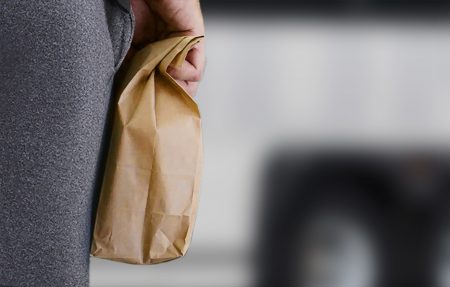By Giulia Szanyi
Spring 2019 Kaplan Award Winner

I didn’t cry. I always cry. Maybe this is what it’s like being an adult I think to myself.
I am aboard yet another grimy Greyhound bus going back to school in Seattle and baffled by my lack of tears after giving my dad our customary long goodbye hug and kiss. He has dutifully dropped me off once again at the station in Pasco at 7:30 am and waited, as he always does, for me to be safely seated before leaving for work. Now I sit and stare out the window at the blue-grey pastel morning outside pleasantly surprised by the warmth of the bus that tells me I will soon have to remove my knee-length, burgundy parka that, when fully zipped, gives the illusion of a sleeping bag ensconcing all but my feet.
The bus is minutes from leaving when outside the bus, five men, no older than 30, have arrived seemingly out of nowhere. Now, Greyhound passengers usually travel solo or at most in pairs (I’ve ridden enough to know) so a group of five is practically unheard of. But the detail that drew me in was their attire.
Three were in grey sweatpants and hoodies, two in beige jumpsuits.
And then I remembered. Across the street and about a minute north of the Greyhound station stands Franklin County Jail.
Brown paper bags in hand, the boisterous bunch climbed on the bus and headed to the back of the bus where they would remain for the ride.
I am sleepy and while this novel occurrence has piqued my interest, it is soon deposited in the back of my drowsy mind to be reexamined later like the bus seats for trash at the end of a voyage. I watch the sun rise in a vivid shock of ladybug red and pumpkin orange while I slowly fall asleep listening to the soothing sounds of Rüfüs du Sol.
We pull into Ellensburg, our third of three stops before Seattle. I know the routine well. The jolt as the bus parks next to the Love’s Travel Stop. The silver-haired, slow-moving male driver struggling through his announcement in his rattle-y smoker’s voice “This is Ellensburg. We will leave in 15 minutes. 15 minutes.” I drag myself out of my seat and find myself in line for the bathroom, my body’s auto-pilot had spirited me past the greasy sausages rotating in their gunky rotten-tooth-yellow case waiting for a desperate customer to give in and take one.
Now I am striding back to the bus projecting a confidence I rarely feel in hopes that the sullen passengers taking their smoke breaks outside the bus will leave me alone.
Back in my seat, I watch. I observe, like a toddler at the zoo analyzing the behaviors of the big cats, the “prisoners” as I have taken to thinking of them. All five are huddled against the beige back wall of Love’s, smoking in the shadows. They are chatting and laughing and one, I notice, sips an Arizona Iced Tea. The tea sticks out to me. It is what I remember best from my safari into the wilds of these men’s lives. Foolish as it is, the tea has managed to make its drinker and his companions appear harmless to me. You can’t have killed or assaulted someone and then be a person who drinks iced tea. “So, you lot were in the slammer for a minor charge,” I conclude. Maybe petty theft or a minor drug charge but nothing serious. With this thought, my curiosity is reawakened and I need to talk to these men. I sit, waiting for my legs to respond to my brain’s desire to know, to connect, to move. GET UP. Do it. I can’t.
The bus journeys on, gliding steadily across the state as the beige shrub-steppe (NOT a desert as all Eastern Washingtonians will tell you) is replaced by deep green pine trees sprinkled with slushy snow, a reminder that the ocean is near.
While the men were prisoners of their cell, I am a prisoner of my mind. This bothered me to an extent I did not expect. An hour after everyone has returned to the bus and it is speeding toward Seattle I am unable to shake my disappointment. I tell myself that a real journalist would have gotten up and gone to talk to the men to learn their stories: who they were and how they got to be taking a Greyhound to Seattle with nothing more than a jumpsuit and brown paper lunch bag to their names. Are they returning home to Seattle or aiming to start a new life there? You would know the answer if you had just had the courage to talk to them.
This incident is filed away in the part of my mind containing all my what ifs. All my “why didn’t you just DO IT?” Moments to be pulled out and be bothered by when I have a spare moment of peace that needs ruining. The words I wish I’d said in high school are fading slowly but the actions I wish I’d taken in recent years are growing, threatening to pop out and sow their sorrows in my mind.
I hope they are doing well, my prisoners. Those unknown men I have come to feel some sort of bond with. They are starting over. Something I often think I want to do. But I’ll continue to carry my regrets as the men carried their brown paper bags, because I have to and because they are familiar and because they are mine.
